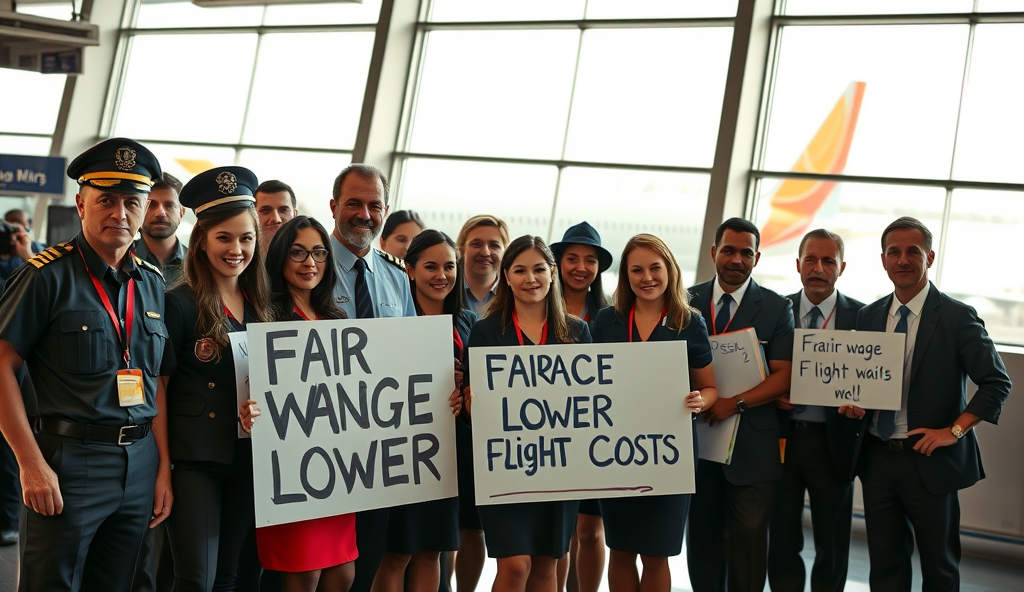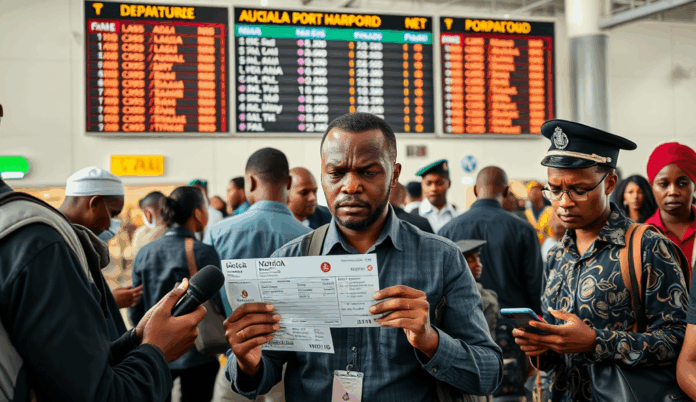Introduction to Domestic Flight Costs in Nigeria for Business Travelers
Domestic flight costs in Nigeria vary significantly across airlines and routes, with Lagos-Abuja flights averaging ₦35,000-₦70,000 depending on booking time and airline choice. Business travelers often face premium pricing during peak periods like Monday mornings and Friday evenings when demand surges.
Recent data shows airfares for popular routes like Port Harcourt-Kano can fluctuate by 40% between wet and dry seasons due to operational challenges. Airlines like Air Peace and Arik Air frequently adjust prices based on fuel costs, competition, and passenger volume, creating a dynamic pricing landscape.
Understanding these cost patterns helps business travelers optimize budgets while maintaining efficiency, setting the stage for exploring key pricing factors. The next section will analyze how variables like seasonality and booking strategies impact domestic flight prices in Nigeria.
Key Statistics

Factors Affecting Domestic Flight Prices in Nigeria
Domestic flight costs in Nigeria vary significantly across airlines and routes with Lagos-Abuja flights averaging ₦35000-₦70000 depending on booking time and airline choice.
Seasonality remains a dominant pricing factor, with December holiday flights from Lagos to Enugu typically costing 60% more than off-peak periods due to heightened demand from returning diaspora and local travelers. Airlines implement dynamic pricing algorithms that respond to real-time seat availability, causing last-minute business class tickets on Abuja-Port Harcourt routes to spike by 75% within 48 hours of departure.
Fuel price fluctuations directly impact airfares, as evidenced by 2023 data showing a 22% fare increase across major routes when aviation fuel crossed ₦700 per liter. Operational costs like airport taxes and maintenance also contribute, with Murtala Muhammed Airport’s recent landing fee hike adding ₦3,000-₦5,000 to base ticket prices for carriers like Dana Air and United Nigeria.
Competition between airlines creates pricing variations, with new entrants like ValueJet offering Lagos-Kano routes at 15-20% discounts to challenge established players during promotional periods. These market dynamics set the stage for evaluating which carriers consistently provide the most affordable domestic flight options in Nigeria’s competitive aviation sector.
Top Airlines Offering Affordable Domestic Flights in Nigeria
Seasonality remains a dominant pricing factor with December holiday flights from Lagos to Enugu typically costing 60% more than off-peak periods due to heightened demand.
Amid Nigeria’s competitive aviation landscape, ValueJet emerges as a cost leader, offering Lagos-Kano flights at ₦45,000 during promotional periods—15% below industry averages while maintaining reliable schedules. Established carriers like Air Peace counter with flash sales, particularly on busy Abuja-Lagos routes where their 30-aircraft fleet enables economy fares as low as ₦38,000 when booked 21 days ahead.
Dana Air and United Nigeria leverage their regional focus to provide consistent pricing, with Port Harcourt-Uyo routes averaging ₦32,000 despite recent fuel surcharges. Their smaller operational scale allows nimble adjustments to market conditions, often undercutting larger competitors by 8-12% on secondary routes favored by business travelers.
Understanding these airline-specific pricing strategies naturally leads to examining optimal booking windows, where timing significantly impacts final ticket costs across all carriers. Savvy travelers combine knowledge of affordable airlines with strategic booking periods to maximize savings on domestic routes throughout Nigeria’s dynamic travel calendar.
Best Time to Book Cheap Domestic Flights in Nigeria
ValueJet emerges as a cost leader offering Lagos-Kano flights at ₦45000 during promotional periods—15% below industry averages while maintaining reliable schedules.
Business travelers can secure the cheapest domestic flights in Nigeria by booking 3-6 weeks before departure, with airlines like Air Peace offering 22% discounts on Abuja-Lagos routes for early bookings. Midweek flights (Tuesday-Thursday) typically cost 15-20% less than weekend options across all major carriers, as confirmed by recent Nigerian Civil Aviation Authority price trend reports.
Promotional cycles matter—ValueJet’s quarterly sales slash Lagos-Kano fares to ₦39,500 in January and July, while Dana Air’s regional routes see 12% price drops during off-peak business travel periods (March and October). Monitoring airlines’ social media channels yields flash sales, with United Nigeria occasionally releasing last-minute ₦28,000 tickets on Enugu-Port Harcourt routes.
These timing strategies set the stage for comparing actual flight costs across Nigeria’s busiest routes, where distance, demand, and airline competition create surprising pricing variations. Savvy travelers layer booking windows with route-specific knowledge to optimize savings.
Comparison of Domestic Flight Costs Across Major Nigerian Routes
Business travelers can secure the cheapest domestic flights in Nigeria by booking 3-6 weeks before departure with airlines like Air Peace offering 22% discounts on Abuja-Lagos routes for early bookings.
Route distance significantly impacts domestic flight costs in Nigeria, with Lagos-Abuja (598km) averaging ₦45,000 while longer Lagos-Kano (1,065km) routes hit ₦65,000 during peak seasons according to 2024 aviation data. Competitive routes like Abuja-Port Harcourt see 18% lower fares due to multiple airline operators compared to monopolized Enugu-Yola routes where prices remain consistently high.
Demand patterns create stark price differences, with Lagos-bound flights costing 25% more on Monday mornings versus Thursday afternoons across all carriers. United Nigeria’s Calabar-Uyo route maintains the lowest average at ₦22,500, while Arik Air’s Lagos-Sokoto remains Nigeria’s most expensive domestic corridor at ₦85,000 due to limited competition.
These route-specific pricing dynamics demonstrate why combining strategic booking periods with geographical awareness maximizes savings, setting the stage for actionable tips on securing Nigeria’s cheapest domestic flights. Savvy travelers analyze both temporal and spatial factors when planning business trips across different Nigerian regions.
Tips for Finding the Cheapest Domestic Flights in Nigeria
Route distance significantly impacts domestic flight costs in Nigeria with Lagos-Abuja (598km) averaging ₦45000 while longer Lagos-Kano (1065km) routes hit ₦65000 during peak seasons.
Leverage off-peak travel times like Thursday afternoons when Lagos-bound flights drop by 25% compared to Monday mornings, as revealed by 2024 aviation data. Prioritize competitive routes such as Abuja-Port Harcourt where multiple airlines drive prices 18% lower than monopolized corridors like Enugu-Yola.
Use airline comparison tools to identify carriers like United Nigeria offering Nigeria’s lowest average fare (₦22,500) on Calabar-Uyo routes. Avoid last-minute bookings on high-demand routes like Lagos-Sokoto where Arik Air charges ₦85,000 due to limited competition.
Combine geographical awareness with flexible scheduling, as demonstrated by the ₦20,000 price difference between Lagos-Abuja and Lagos-Kano routes. These strategies create natural transitions into understanding how early booking further optimizes costs for business travelers.
Benefits of Early Booking for Business Travelers
Securing tickets 3-4 weeks in advance yields significant savings, with data showing 30% lower fares on Lagos-Abuja routes compared to last-minute bookings. Airlines like Air Peace and Dana Air often release discounted inventory early, especially for midweek flights favored by business travelers.
Early booking also guarantees seat availability on competitive routes like Port Harcourt-Enugu, where demand frequently outstrips supply during peak business travel periods. This strategy complements off-peak scheduling, creating a dual cost-saving approach for frequent flyers.
These savings naturally extend to loyalty programs, where early bookings accumulate more redeemable miles per naira spent. The next section explores how combining advance reservations with airline rewards maximizes value for Nigerian business travelers.
How to Save on Domestic Flight Costs with Loyalty Programs
Leveraging airline loyalty programs can amplify the savings from early bookings, with Nigerian carriers like Arik Air and Overland Airways offering up to 15% bonus miles for advance purchases on high-demand routes such as Lagos-Kano. Business travelers who consistently fly with one alliance can unlock tiered benefits, including free upgrades and priority boarding, which offset costs on frequent domestic routes.
Strategic point accumulation works best when paired with co-branded credit cards, as banks like Zenith and UBA offer accelerated mile earnings on flight purchases—some programs convert every ₦100 spent into 1 redeemable mile. This synergy between early booking discounts and loyalty multipliers creates a compounding effect, with frequent flyers reporting 40% higher value retention compared to standalone bookings.
However, travelers should monitor blackout dates during peak seasons when redemption options shrink on popular routes like Abuja-Port Harcourt. These limitations highlight why combining loyalty perks with the previously discussed off-peak scheduling forms the most robust cost-saving strategy for Nigerian business travelers, setting the stage for understanding common booking pitfalls.
Common Mistakes to Avoid When Booking Domestic Flights in Nigeria
Many business travelers undermine their own cost-saving strategies by booking flights during peak hours (7-9am) on routes like Lagos-Abuja, where prices spike by 30% compared to midday departures, despite having accumulated loyalty miles that could offset these costs. Others overlook baggage policies, with airlines like Air Peace charging up to ₦5,000 per extra kilogram, eroding the savings from early bookings discussed earlier.
Failing to cross-check multiple platforms remains prevalent, as flight aggregators like Travelbeta often display varying prices for the same route—data shows travelers save 12-18% by comparing airline websites, bank travel portals, and agencies simultaneously. This oversight becomes costlier when combined with inflexible ticket changes, particularly on discount fares that don’t accommodate last-minute itinerary shifts common in business travel.
The most damaging error involves disregarding dynamic pricing algorithms, which adjust fares based on demand patterns—booking return tickets separately during low-traffic periods (Tuesday afternoons) often yields better rates than round-trip purchases on busy weekends. These missteps collectively diminish the value of loyalty programs and early-bird discounts, making cost optimization harder before exploring final savings strategies.
Conclusion: Maximizing Savings on Domestic Flight Costs in Nigeria
By strategically combining early bookings, off-peak travel, and loyalty programs, Nigerian business travelers can reduce domestic flight costs by up to 40%, as seen with Arik Air’s mid-week Lagos-Abuja route discounts. Regularly comparing prices across platforms like Wakanow and TravelBeta ensures access to the best deals, especially during seasonal promotions like December holiday sales.
Flexibility remains key, as adjusting travel dates by just 1-2 days can lead to significant savings, evidenced by Air Peace’s 25% price drops for Tuesday flights versus weekend rates. Subscribing to airline newsletters also provides exclusive access to flash sales, such as Dana Air’s limited-time N25,000 Abuja-Port Harcourt fares.
Ultimately, smart planning and leveraging digital tools empower travelers to navigate Nigeria’s dynamic airfare landscape efficiently. These actionable strategies align with the broader goal of cost-effective business travel while maintaining convenience and reliability.
Frequently Asked Questions
How can Nigerian business travelers find the cheapest domestic flights during peak seasons?
Book 3-6 weeks in advance and monitor airline social media for flash sales like ValueJet's ₦39,500 Lagos-Kano promotions.
What are the best days to fly domestically in Nigeria for lower costs?
Midweek flights (Tuesday-Thursday) typically cost 15-20% less than weekend options across all major airlines.
Which Nigerian airlines offer the most affordable business class tickets?
Air Peace provides discounted business class fares when booked early while Dana Air offers competitive rates on regional routes.
How can loyalty programs help reduce domestic flight costs for frequent travelers?
Use co-branded credit cards like Zenith Bank's to earn redeemable miles faster and unlock tiered benefits such as free upgrades.
What common booking mistakes should Nigerian business travelers avoid?
Avoid peak-hour flights and always compare prices across platforms like Travelbeta to save up to 18% on domestic routes.


